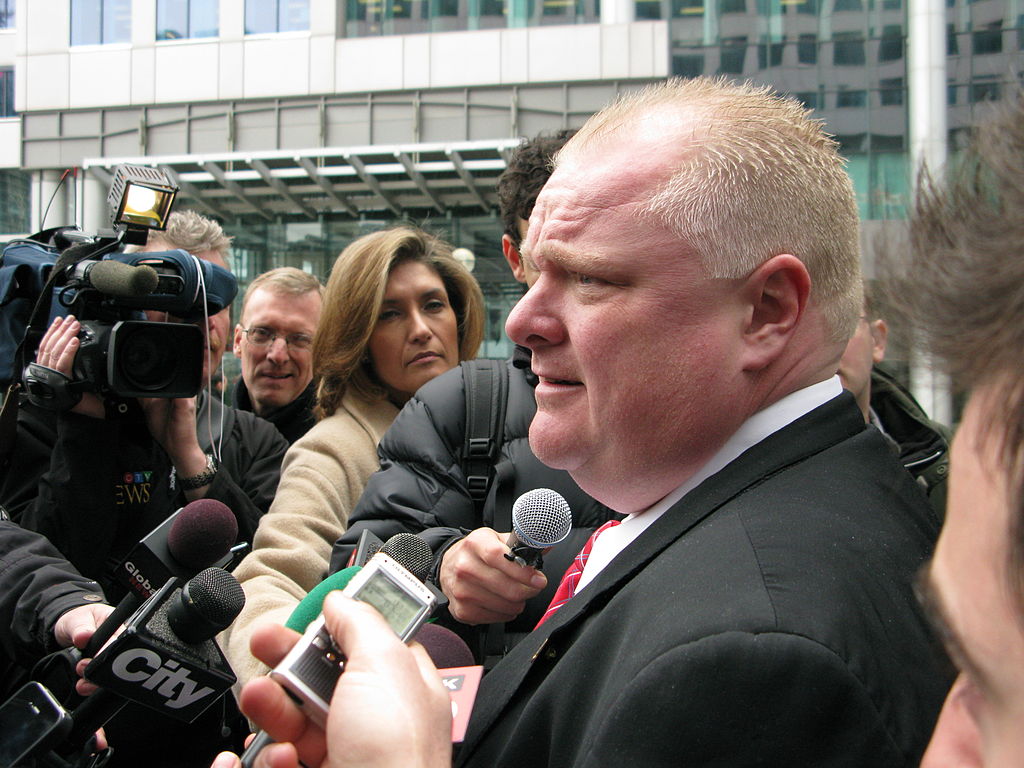Like this article? rabble is reader-supported journalism. Chip in to keep stories like these coming.
Rob Ford is dead. The former Toronto mayor died of cancer this morning, at 46 years old. According to news reports and social media, we are in mourning, as always, expected to politely and respectfully honour men when they pass, even if they were bad men.
Rob Ford was a bad man.
There are people in his life who are likely hurting due to their loss, I understand this. But I also understand that there are people in his life who are now free from his abuse. In death, must we forget about men’s abuse?
Rob Ford was “flawed,” the media tells us. He had a “dark side.” They will admit he smoked crack, as though this is a great sin or something that defines one’s character. Few will admit to much else. Out of “respect.”
I don’t care that Rob Ford was an alcoholic or a crack addict. The number of people in our society who struggle with substance abuse are countless. I do care about how his addictions impacted those around him, but crack was not Ford’s biggest “flaw.”
Today, the CBC called him a “millionaire with a working-class attitude.” No. He was a millionaire who hated the poor. Like many other millionaires. If anything, Ford was a kind of Trump-lite, somehow seen as an “everyman” because he is so brave as to admit his bigotry publicly and proudly.
Certainly he did not support struggle of the working class, anti-union as he was. The CBC is correct that he became an “international celebrity for his drug and alcohol use while in office,” but he shouldn’t have been infamous for that reason. Rather, it should have been his treatment of women, people of colour, and the poor that brought him infamy.
As far as political successes go, he had none, really, unless you count getting garbage privatized on one side of the city as a notable accomplishment. The fact that he “spoke to” many people is only notable in what it reveals about people. It reveals nothing positive about Ford’s impact on politics, Toronto, or on Canadians.
“A dedicated man of the people,” he was called, in a statement from “his family” (I do not know which members of his family prepared this statement). No. He was not a man of “the people,” he was a man who was out for himself and others like him: white middle- or upper-class men.
He outright rejected the existence of homeless shelters, was overtly homophobic and racist, suggesting, in 2003, that Toronto be declared a “refugee-free zone.” Ford was charged with assaulting and threatening to kill his wife, Renata, in 2008 (though the charges were dropped), and in 2011 she reportedly placed a call to 911, with regard to a “verbal altercation” between herself and her husband.
In 2012, the police were called to Renata’s parent’s house, where she was found with “numerous physical injuries including scrapes, bruising and cuts” on her face and body (he was not charged in this circumstance either).
The police say they have received many calls from the Ford residence, related to domestic abuse. He sexually harassed women, dragging his wife with him into the media in order to defend himself, humiliating her (further) in the process. He said, of mayoral contender Karen Stintz, “I’d like to fucking jam her.” He, apparently, offered to let his friends have sex with his wife and bragged about cheating on her.
I could go on. You get the point.
People make mistakes, they say things they should not have said, they behave in ways they regret. There is no reason to expect perfection from human beings and there are many circumstances under which we should forgive mistakes. But these behaviours, exhibited by Ford, repeatedly, were not simply “flaws” or “mistakes” so much as they were a deep sense of entitlement and a bigoted ideology. And if Ford was simply “an ordinary man,” as the media is fond of saying, what does that say, then, about “ordinary men?”
I am not celebrating his death, but I find myself unable to mourn respectfully, as I am expected to. Rather, I am saddened that so many allowed him to mistreat those around him, throughout his life. I am sad that his wife and other women suffered his wrath. I am sad for the prostituted women he paid. I am sad for the women he sexually harassed. I am sad that men like him exist and prosper in our society.
But apart from that, I am not able to muster an ounce of sadness at the loss of yet another abusive, entitled man. I will not pretend away reality simply because he is dead. I won’t respect men who showed so little respect for humanity.
Like this article? rabble is reader-supported journalism. Chip in to keep stories like these coming.
Image: Wikimedia Commons



